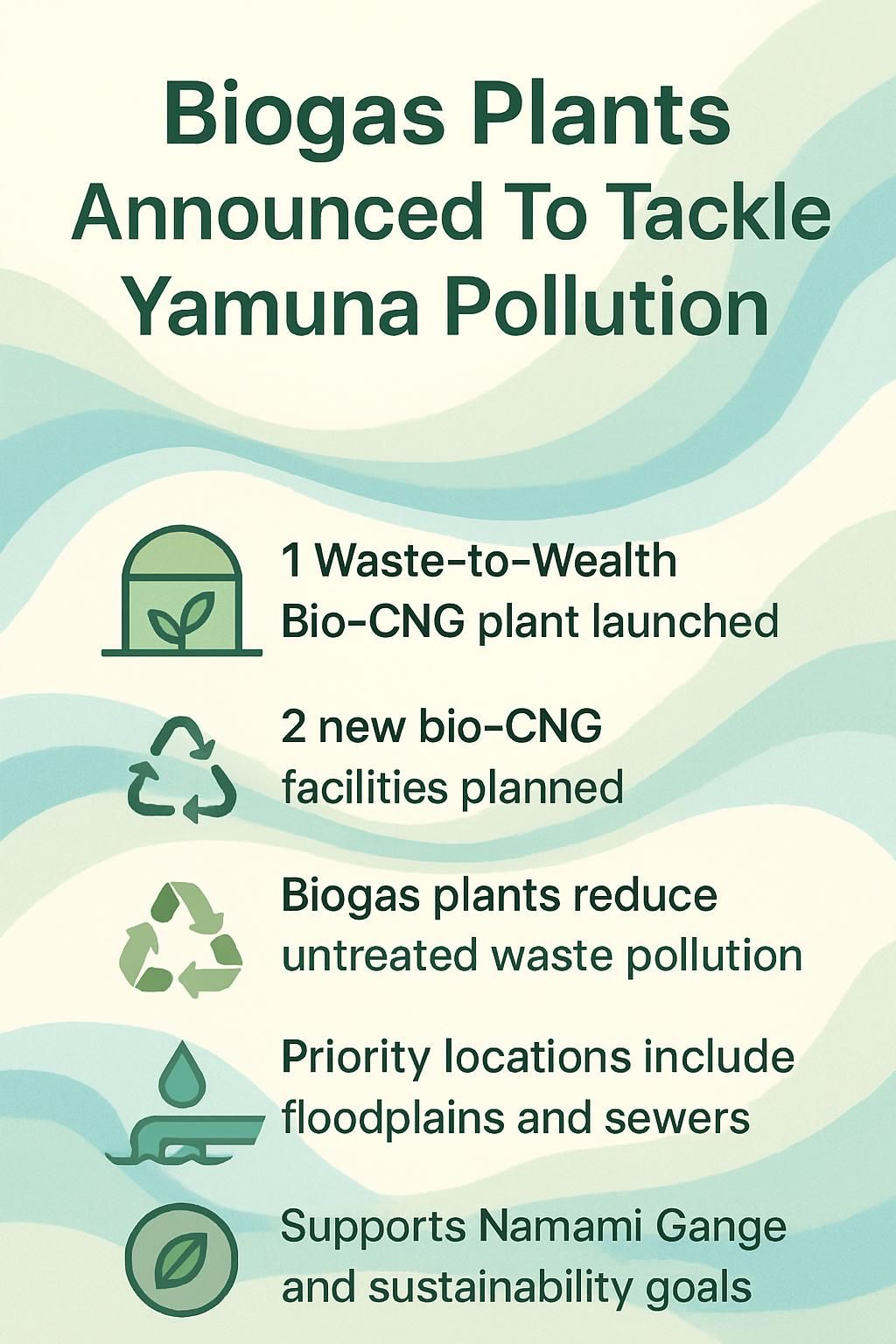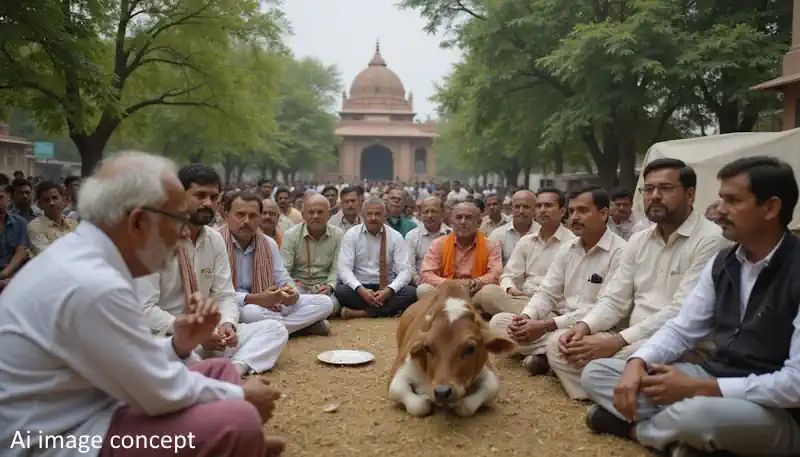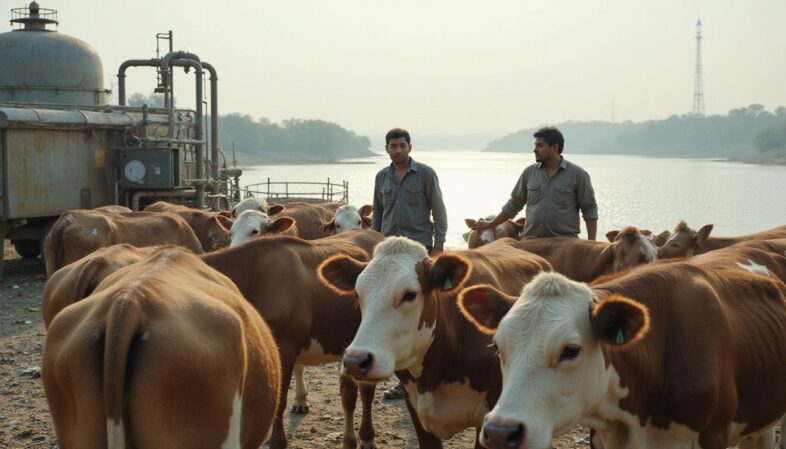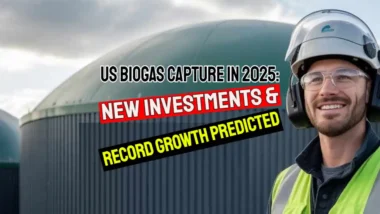The Yamuna River, once a lifeline for millions, now struggles under the weight of pollutants like untreated sewage and industrial waste. Its water quality has declined drastically, affecting aquatic life and public health.
People near its banks face challenges such as foul odours, contaminated waters, and limited access to clean water.
In a bid to combat this crisis, Delhiâs Chief Minister Rekha Gupta has taken bold steps. She recently launched a Waste-to-Wealth Bio-CNG Plant in Kumar village to process cow dung into eco-friendly energy.
As part of her governmentâs “Yamuna Pollution Prevention” efforts, plans for more biogas plants are underway near Delhi's dairy hubs.
This blog will shed light on how these initiatives could transform waste management while reducing river pollution. Keep reading if you want solutions to restore the Yamuna's lost glory!
Key Takeaways
- Delhiâ's Chief Minister Rekha Gupta launched a Waste-to-Wealth Bio-CNG plant in Kumar village, Mathura, transforming cow dung into compressed natural gas and organic manure. This project aims to reduce Yamuna River pollution.
- Plans are underway for two new bio-CNG facilities near dairy hubs in Delhi to manage large amounts of cow dung while producing green energy.
- Biogas plants will cut water pollution by addressing untreated waste from dairy colonies, industrial zones, and urban regions with poor sewage systems.
- Sites like floodplains prone to illegal dumping and areas near interceptor sewers under the Yamuna Action Plan are priority locations for future projects.
- These eco-friendly initiatives align with sustainable goals such as reducing biochemical oxygen demand (BOD) levels and supporting the Namami Gange Programme for cleaner rivers.

Delhi Chief Minister's Advocacy in Mathura

The Delhi Chief Minister visited Mathura, blending calls for eco-friendly initiatives with spiritual undertones. He pushed for sustainable solutions, linking divine reverence to pollution control efforts.
Spiritual and Governmental Actions
Rekha Gupta visited Mathura on 30 June 2025, blending her spiritual devotion with her role as a policymaker. She prayed at the Banke Bihari Temple and completed a barefoot Govardhan Parikrama to seek divine blessings for Delhi's residents.
Her actions showed respect for cultural traditions while addressing environmental challenges faced by the city.
Gupta used her visit to push critical biogas initiatives forward. Upon returning from Mathura, she issued directives emphasising biogas plants near dairy hubs in Delhi. These sites would focus on converting cow dung into Bio-CNG while tackling organic waste pollution around local waterways like the River Yamuna.
Launching Biogas Plants to Transform Waste
Delhi has turned waste management into a green revolution with biogas plants that promise to transform rubbish into cleaner energyâcurious how it works?

Establishment of Waste-to-Wealth Bio-CNG Plant
Rekha Gupta inaugurated the cutting-edge Waste-to-Wealth Bio-CNG plant in Kumar village, Mathura. This facility transforms cow dung into compressed natural gas and organic manure using advanced anaerobic digestion processes.
Capable of processing tonnes of waste daily, it addresses solid waste pollution while producing green fuel.
The project directly contributes to tackling untreated wastewater affecting nearby ecosystems like the Yamuna River. By upcycling waste, it reduces biochemical oxygen demand (BOD) levels in agricultural runoff linked to eutrophication.
These steps align with sustainable development goals and strengthen Delhi's efforts under initiatives like the Namami Gange Programme for cleaner rivers.
Expansion Plans for Bio-CNG Projects in Delhi
The Chief Minister of Delhi has taken significant steps to expand bio-CNG projects in the city. Two new bio-CNG facilities will soon be established near dairy colonies, focusing on organic waste like cow dung for processing.
These plants aim to reduce pollution in the Yamuna River while promoting sustainable energy through biogas production.
Plans are underway to identify more locations across Delhi for future bio-CNG plants. These efforts concentrate on areas with high waste output, like dairy clusters, ensuring a consistent supply of raw materials.
Processing such waste helps reduce water contamination and supports initiatives such as organic fertiliser production and green energy development.
Tackling Yamuna River Pollution
Teams are setting up biogas plants at key locations to handle waste, reduce effluent discharge, and breathe life back into the Yamuna.

Critical Sites for Biogas Facilities
Biogas facilities can play a huge role in cleaning the Yamuna River. Identifying strategic sites is essential for maximising their impact on pollution control and energy production.
- Dairy colonies near Delhi generate large amounts of waste daily. Locating biogas plants near these clusters will handle cow dung effectively while curbing water pollution.
- Industrial zones close to the Yamuna contribute significant industrial effluents. Establishing treatment plants in these areas can manage wastewater and reduce toxic discharges into the river.
- Dense urban regions with poor sewage systems often dump untreated domestic sewage into nearby waterways. Building anaerobic digestion plants here will process organic waste more efficiently.
- Areas experiencing excessive algae growth due to untreated nutrient-rich water are high-priority spots for biogas projects. These plants can transform harmful waste into clean energy while restoring biodiversity.
- Sections near existing sewage treatment plants serve as ideal locations for setting up biogas facilities. By integrating processes, these plants can improve treatment efficiency and reduce sludge disposal issues.
- Floodplain zones prone to illegal rubbish dumping also need attention. New facilities can address this uncontrolled waste disposal while promoting sustainability efforts.
- Locations along interceptor sewers installed under the Yamuna Action Plan should host biogas units to complement ongoing initiatives like water reuse and recycling.
- Proximity to local farming communities will encourage organic farming through biogas by-products like fertilisers, reducing reliance on chemical alternatives that harm ecosystems.
- Regions with high levels of raw sewage discharge require urgent intervention through wastewater treatment plant integration with biogas conversion technologies, tackling pollution at its source effectively!
Integrating Cow Dung Management with Pollution Reduction
Locating biogas plants near dairy clusters addresses the root of waste pollution. Kumar village's Bio-CNG plant serves as a blueprint, transforming cow dung into CNG and organic manure.
This process fights pollution while producing green energy.
Cow waste left untreated often leads to water contamination in the Yamuna River. Effluent treatment solutions can further curb this issue by managing runoff effectively. Such initiatives align with Delhiâs push for sustainable options, including effluent treatment plants at critical sites.
Strengthen Commitment to Combating Pollution
Delhi ramps up eco-friendly actions with fresh bio-CNG proposals to fight water pollution head-on.

Endorse Long-term, Eco-friendly Strategies
Rekha Gupta prioritised eco-friendly strategies with the launch of bio-CNG plants. These facilities use cow dung to produce compressed natural gas and organic manure, reducing pollution levels in the Yamuna.
Such efforts integrate circular economy principles while contributing to Delhiâs renewable energy goals. Plans for two more plants near dairy colonies aim to sustain this green momentum.
Advancing waste-to-energy solutions strengthens biodiversity conservation efforts. Constructed wetlands and bioremediation techniques complement these initiatives by filtering toxins naturally.
Gupta's commitment ties into broader corporate social responsibility measures, engaging communities in combating water depletion and pollution of holy rivers like Yamuna and Ganga.
**- Proposal for Additional Bio-CNG Initiatives**
Proposal for Additional Bio-CNG Initiatives
Expanding bio-CNG projects aims to curb Yamuna River pollution. Delhi plans new plants near dairy clusters, focusing on cow dung recycling. Two upcoming facilities will begin operations soon close to major dairy colonies.
These sites target unchecked waste contributing to pollution of water in the region. This practical solution is part of efforts to integrate sustainable options with existing infrastructure.
Identifying critical locations remains essential for success. The government eyes areas linked with high fecal coliform levels and untreated sewage flow into the Yamuna River. Bio-CNG plants can also produce environmentally friendly compressed gas while handling waste efficiently.
Advanced methods like activated carbon filtering or membrane separation could support these projects further, reducing harmful impacts caused by improper disposal practices over decades.
Progress in Biogas Project Implementation
Officials rolled up their sleeves, finalising plans for new biogas plants to clean Delhiâs air and waterâcurious how theyâll pull it off?
Discussions with Key Government Officials
Delhi Chief Minister Rekha Gupta met senior officials on 30 June 2025 to speed up plans for biogas plants. She directed teams to focus on developing facilities near dairy clusters.
The discussions highlighted inadequate cow dung management by earlier administrations, linking it directly to Yamuna pollution.
Plans are in motion for two new bio-CNG projects close to Delhiâs dairy colonies. Officials proposed expanding similar initiatives citywide. The meeting reinforced efforts tied to the National Mission for Clean Ganga and stressed eco-friendly waste solutions like advanced oxidation processes and cow dung recycling techniques.
Essential Contributions to Delhi's Environmental Health
Biogas plants have taken centre stage in addressing Delhi's pollution. Rekha Gupta led efforts to set up a Waste-to-Wealth Bio-CNG plant in Mathura, setting an example for similar projects citywide.
This facility converts cow dung into compressed natural gas and organic manure. This approach reduces waste while contributing to green energy production, addressing key environmental challenges directly.
Important locations near dairy hubs are targeted for these biogas units. These areas face significant contamination from untreated waste flowing into the Yamuna River, including fecal coliform bacteria.
Effectively managing cow dung has proven essential in reducing pollution levels at source points. Plans include expanding this model across Delhi, promising better air quality and cleaner water systems as efforts continue to address “Tackling Yamuna River Pollution”.
Conclusion
Delhiâs new biogas projects carry both promise and purpose. Transforming waste into green energy tackles pollution while offering practical solutions for cow dung management. These plants are a step closer to reviving the Yamuna Riverâs health and purity.
With swift action and sustained commitment, this plan could turn dreams of cleaner waters into reality.
FAQs
1. What are biogas plants, and how do they help reduce Yamuna pollution?
Biogas plants convert organic waste into energy while reducing harmful pollutants like microplastics and sewerage in the river. They also cut down on plastic pollution and promote environmental consciousness.
2. How will these plants tackle water hyacinth in the Yamuna?
Water hyacinth, or *Eichhornia crassipes*, is a major pollutant. Biogas plants can process it to produce energy while preventing its spread across the river.
3. Are other technologies being used alongside biogas plants for cleaning the Yamuna?
Yes, methods like rainwater harvesting, reverse osmosis, ultrafiltration, electrodialysis, and phytoremediation are part of broader efforts to restore the river's health.
4. Who is responsible for setting up these biogas plants?
The Ministry of Environment collaborates with NGOs and corporate social responsibility (CSR) initiatives to fund and implement these projects as part of better governance strategies.
5. Will this initiative affect agriculture near the Yamuna?
Yes, treated waste from biogas plants can be converted into eco-friendly fertilisers that support green living without harming crops or soil quality near rivers like Ganga and Yamunotri tributaries.






